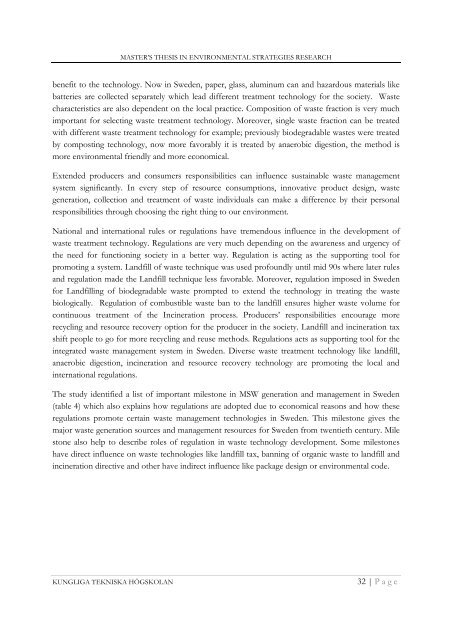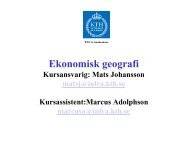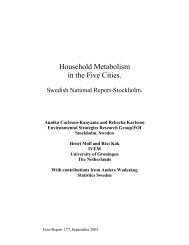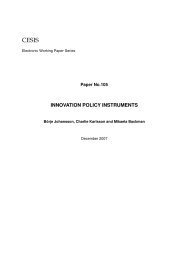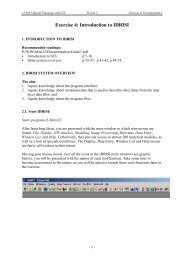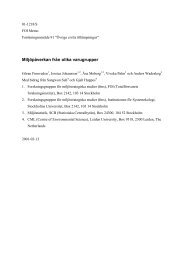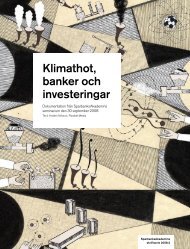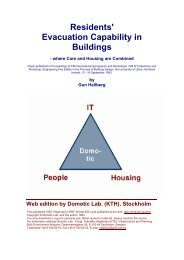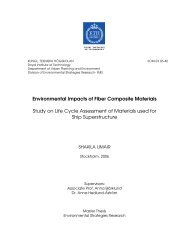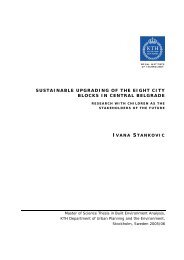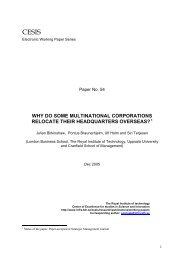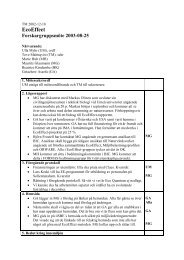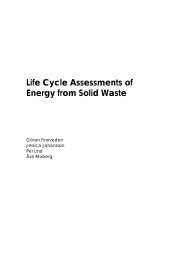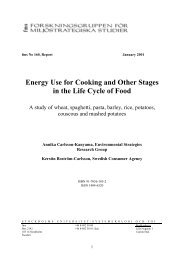Technical Development of Waste Sector in Sweden: Survey
Technical Development of Waste Sector in Sweden: Survey
Technical Development of Waste Sector in Sweden: Survey
Create successful ePaper yourself
Turn your PDF publications into a flip-book with our unique Google optimized e-Paper software.
MASTER’S THESIS IN ENVIRONMENTAL STRATEGIES RESEARCH<br />
benefit to the technology. Now <strong>in</strong> <strong>Sweden</strong>, paper, glass, alum<strong>in</strong>um can and hazardous materials like<br />
batteries are collected separately which lead different treatment technology for the society. <strong>Waste</strong><br />
characteristics are also dependent on the local practice. Composition <strong>of</strong> waste fraction is very much<br />
important for select<strong>in</strong>g waste treatment technology. Moreover, s<strong>in</strong>gle waste fraction can be treated<br />
with different waste treatment technology for example; previously biodegradable wastes were treated<br />
by compost<strong>in</strong>g technology, now more favorably it is treated by anaerobic digestion, the method is<br />
more environmental friendly and more economical.<br />
Extended producers and consumers responsibilities can <strong>in</strong>fluence susta<strong>in</strong>able waste management<br />
system significantly. In every step <strong>of</strong> resource consumptions, <strong>in</strong>novative product design, waste<br />
generation, collection and treatment <strong>of</strong> waste <strong>in</strong>dividuals can make a difference by their personal<br />
responsibilities through choos<strong>in</strong>g the right th<strong>in</strong>g to our environment.<br />
National and <strong>in</strong>ternational rules or regulations have tremendous <strong>in</strong>fluence <strong>in</strong> the development <strong>of</strong><br />
waste treatment technology. Regulations are very much depend<strong>in</strong>g on the awareness and urgency <strong>of</strong><br />
the need for function<strong>in</strong>g society <strong>in</strong> a better way. Regulation is act<strong>in</strong>g as the support<strong>in</strong>g tool for<br />
promot<strong>in</strong>g a system. Landfill <strong>of</strong> waste technique was used pr<strong>of</strong>oundly until mid 90s where later rules<br />
and regulation made the Landfill technique less favorable. Moreover, regulation imposed <strong>in</strong> <strong>Sweden</strong><br />
for Landfill<strong>in</strong>g <strong>of</strong> biodegradable waste prompted to extend the technology <strong>in</strong> treat<strong>in</strong>g the waste<br />
biologically. Regulation <strong>of</strong> combustible waste ban to the landfill ensures higher waste volume for<br />
cont<strong>in</strong>uous treatment <strong>of</strong> the Inc<strong>in</strong>eration process. Producers’ responsibilities encourage more<br />
recycl<strong>in</strong>g and resource recovery option for the producer <strong>in</strong> the society. Landfill and <strong>in</strong>c<strong>in</strong>eration tax<br />
shift people to go for more recycl<strong>in</strong>g and reuse methods. Regulations acts as support<strong>in</strong>g tool for the<br />
<strong>in</strong>tegrated waste management system <strong>in</strong> <strong>Sweden</strong>. Diverse waste treatment technology like landfill,<br />
anaerobic digestion, <strong>in</strong>c<strong>in</strong>eration and resource recovery technology are promot<strong>in</strong>g the local and<br />
<strong>in</strong>ternational regulations.<br />
The study identified a list <strong>of</strong> important milestone <strong>in</strong> MSW generation and management <strong>in</strong> <strong>Sweden</strong><br />
(table 4) which also expla<strong>in</strong>s how regulations are adopted due to economical reasons and how these<br />
regulations promote certa<strong>in</strong> waste management technologies <strong>in</strong> <strong>Sweden</strong>. This milestone gives the<br />
major waste generation sources and management resources for <strong>Sweden</strong> from twentieth century. Mile<br />
stone also help to describe roles <strong>of</strong> regulation <strong>in</strong> waste technology development. Some milestones<br />
have direct <strong>in</strong>fluence on waste technologies like landfill tax, bann<strong>in</strong>g <strong>of</strong> organic waste to landfill and<br />
<strong>in</strong>c<strong>in</strong>eration directive and other have <strong>in</strong>direct <strong>in</strong>fluence like package design or environmental code.<br />
KUNGLIGA TEKNISKA HÖGSKOLAN<br />
32 | Page


